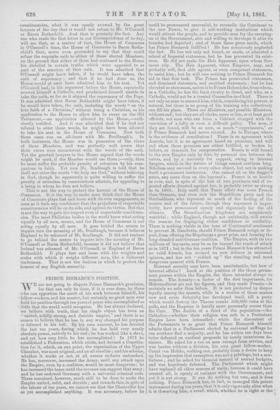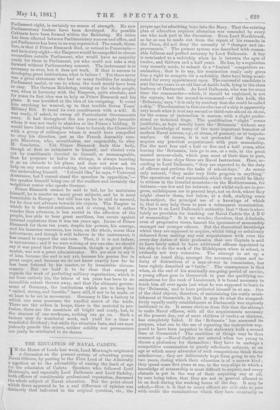PRINCE BISMARCK'S POSITION.
WE are not going to dispute Prince Bismarck's greatness, for that can only be done, if it is over done, by those who can apportion the merit of his work between himself, his fellow-workers, and his master, but certainly no great man ever held his position through ten years of peace who accomplished so little that the world could recognise. He has always declared, we believe with truth, that his single object has been an "united, solidly strong, and durable empire," and there is no reason to believe that he has in any way changed his purpose •
or faltered in his toil. By his own account, he has devoted the last ten years, during which he has held very nearly absolute power, entirely to his end ; he has worked like a slave, .and yet how very little he has accomplished ! In 1871 he 'established a Federation, which exists, and devised a Constitu- tion for it, which, on one point, the organisation of the Upper Chamber, was most original, and on all sensible ; and his scheme, whether it works or not, at all events endures untouched. He has, moreover, increased the Army, until any attack upon the Empire, even by a coalition, would be most dangerous; he has increased the taxes until the revenue can support that army; and he has endowed Germany with a universal criminal code. There remained, however, much still to be done to make the Empire united, solid, and durable ; and towards this, in spite of stale labour of ten years, wo cannot see that the Chancellor has as yet accomplished anything. It was necessary, before he
could be pronounced successful, to reconcile the Continent to the new Power, to give it self-working institutions which would attract the people, and to provide men for the carrying- on of the Government, able and willing to develops it after its founder had departed ; and of those three great needs, which has Prince Bismarck fulfilled ? He has notoriously neglected the last. He has not only not found, or made, or educated a school of Imperial statesmen, but he has prevented its exist- ence. He did not make the Heir Apparent, upon whom Ger- mans rely. The Heir Apparent, when Emperor, may, and probably will, find able agents, or even competent statesmen, to assist him ; but he will owe nothing to Prince Bismarck for aid in that first task. The Prince has prosecuted statesmen, and dismissed statesmen, and snubbed statesmen ; but lie has elevated no statesman, unless it be Prince Hohenlohe, from whom, as a Catholic, he has the least rivalry to dread, and who, as a Catholic, would not be a trusted Counsellor-in-Chief. There is not only no man to succeed him, which, considering his powers, is natural, but there is no group of his training who collectively can fill his place. There are Ministers, and possible Ministers, without end ; but they are all clerks, more or less, or at least good officials, not men who can form a Cabinet charged with the execution of a lofty or even a difficult policy. The men, if they are found, will be as new, as much "experiments," as if Prince Bismarck bad never existed. As to Europe, where is the evidence of conciliation ? There is an agreement with Austria, but it is an agreement based on promises, and will end when those promises are either fulfilled, or broken by failure, or demands for compensation. Russia is still bound to the new Empire only by fear, by personal ties between the rulers, and by a necessity for support, owing to internal dangers, which in the nature of things cannot continue long. Nihilism may succeed in every other object, but not in making itself a permanent institution. One cannot sit on the dagger's point, any more than on the bayonet's. France is as hostile as ever, and, in spite of the loss of two provinces and of re- peated efforts directed against her, is probably twice as strong as in 1869. Italy until this Tunis affair was more French than German, and even now the Republican party and the Garibaldians, who represent so much of the feeling of the masses and of the future, though they represent it imper- fectly, have pronounced openly and vigorously for the old alliance. The Scandinavian kingdoms are suspiciously watchful ; while England, though not unfriendly, still awaits the reasons for displaying either confidence or cordiality. There is nothing visible in the tone of Continental sentiment to prevent M. Gambetta, should Prince Bismarck resign or de- part, from offering the Hapsburgs a great prize, and forming the long-dreaded anti-German coalition. The Empire, with its two millions of bayonets, may be as far beyond the reach of attack as in 1871; but in the ten years Prince Bismarck has attracted no solid friends, has secured no new defence in universal opinion, and has not " redded up " the standing and most dangerous quarrel with France.
External security may have been unattainable, but how of internal affairs ? Look at the position of the three perma- nent powers within the Empire, the three intended always to remain. The dynasty—a factor of the first importance, for Hohenzollerns are not lay figures, and they made Prussia—is certainly no safer than before. It is not protected by deeper loyalty among the masses, while in a section of those masses new and acute disloyalty has developed itself, till a party which would destroy the Throne counts 500,000 votes at the polls, and the Emperor is hardly more personally secure than the Czar. The doubts of a third of the population—the Catholics—whether their religion was safe in a Protestant Empire have been intensified ; while the discontent of the Protestants is so great that Prince Bismarck himself admits that in a Parliament elected by universal suffrage he can nowhere find a majority, and he has within ten days been twice defeated on cardinal proposals by nearly unanimous de- cisions. He asked for a tax on men exempt from service, and was beaten without a division, his own great fellow-worker, Count von Moltke, walking out, probably from a desire to keep up the impression that exemption was not a privilege, but a mis- fortune ; and.he asked for biennial instead of annual budgets, and was hopelessly defeated. The Parliament which might have replaced all other sources of unity, because it could have created all, is openly at variance with the Government, and yet it is not strong. It can do nothing but veto, and it does nothing. Prince Bismarck has, in fact, so managed this potent instrument during ten years, that it is only vigorously alive when it is thwarting him, a result which, whether he is right or the ; Parliament right, is certainly no source of strength. No new Parliamentary leaders have been developed. No possible Cabinets have been formed within the Reichstag. No union has been effected between Parliamentary success and office, and
yet Parliament has been in no way superseded. The result, there- fore, is that if Prince Bismarck died, or retired to Pomerania— and he is sixty--eight—the Emperor would be compelled to choose
counsellors outside Parliament, who would have no majority ready for them in Parliament, yet who could not take a step forward without Parliamentary consent. The instrument is as necessary as ever, but it does not work. If that is success in developing great institutions, what is failure ? Yet there never was a groat statesman who had so many facilities for making Parliament useful, or one to whom the work would have been so easy. The German Reichstag, resting on the whole people, was, when in harmony with the Emperor, quite absolute, and for years its first idea was to help on Prince Bismarck and his plans. It was horrified at the idea of his resigning. It voted him anything he wanted, up to that terrible Seven Years' Military Bill. It taxed its own constituents with a will. It was ready, if asked, to sweep all Particularist Governments away. It had throughout the ten years no single favourite whom it was not ready to abandon at the Prince's bidding. It would have liked nothing better than to furnish the Chancellor with a group of colleagues whom it would have compelled to obey his direction, just as the French Assembly com- pels Ministers, who, nevertheless, are responsible, to obey M. Gambetta, Yet. Prince Bismarck finds this body, though at first so submissive to himself, and elected even yet by constituents devoted to himself, so unmanageable, that be proposes to halve its sittings, is always taunting it as an obstacle to his plans, and does not now ask its help on any serious undertaking, but rather withdraws from the undertaking himself. " I should like," he says, " Universal Assurance, but I cannot stand the speeches in opposition,"— the speaker himself being one of the readiest and certainly the weightiest orator who speaks German. Prince Bismarck cannot be said to fail, for lie maintains himself, he is master on many great subjects, and he is most formidable in Europe ; but still less can he be said to succeed, for ho does not advance towards his objects. The Empire to which he is devoted continues, and is strong, but it rather recedes than advances, is less rooted in the affection of the people, less able to bear great sacrifices, less secure against internal explosions than it was ten years ago. Its use of Prince Bismarck for those ten years, despite his powers, his courage, and his immense resources, has been, on the whole, worse than infructuous, and though it still believes in the instrument, it has ceased to expect the out-turn. That, if it is not failure, is not success ; and if we were writing of any one else, we should say it was proof that Prince Bismarck, though a great diplo-
matist, was not a great administrator. We are slow to say it of him, because the end is not yet, because his genius lies in great coups, and because we do not know exactly how far he
has been fettered by his master, or by irresistible circum- stances. But we hold it to be clear that except as regards the work of perfecting military organisation, which is far from entirely his, the labour of ten years has been to an incredible extent thrown away, and that the ultimate govern. ment of Germany, the institutions which are to keep her " united, strong, and durable," have still, if not to be made, or at least to be set in movement. Germany is like a factory in which one man possesses the needful secret of the trade., Thero are the orders in heaps, there is the material in pro- fusion, there are the machines all bright and ready, but, in
the absence of one workman, nothing can go on. Such a factory may do wonderful work, and yield for a time a wonderful dividend ; but while the situation lasts, and one man jealously guards the secret, neither solidity nor permanence can justly be attributed to its shares.







































 Previous page
Previous page